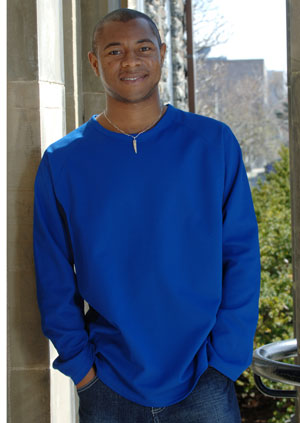 |
| McCollins Jones is doing a combinedscience and management degree. (Danny AbrielPhoto) |
McCollins Jones is giving hundreds of kids in his native SierraLeone a head start on life with a project he calls “School ina Box.”
The Dalhousie student, who is working toward a combined scienceand management degree, is honing his entrepreneurial skills tofurther develop the project.
Spearheaded by Mr. Jones and two friends in 1997, there wasinitially no infrastructure and no real funding for the idea—just a commitment to improving the lot of the area’s kids.The idea was to create opportunities for kids whose parents couldnot afford to send them to school.
In the midst of a civil war, which raged for a decade until 2002in Sierra Leone, this was more important than ever. More than athousand primary schools throughout the countryside were destroyedduring the war. In 2001, it’s estimated that two-thirds ofall Sierra Leone children had stopped going to schoolaltogether.
“It started as a sporting activity to get kids back to theclassroom instead of becoming child soldiers in the war and itbecame something bigger,” says Mr. Jones, 34.
He was in a unique position to provide leadership and inspireothers to join the cause. An elite athlete in his native country– he won a gold medal in the West African AthleticsChampionship in triple jump – he used his celebrity tomotivate his community and to start to change lives.
School in a Box contains most things needed to operate a school,including computers, school supplies, even clothing, shipped in acontainer from Canada.
Building schools
Over time, School in a Box changed from merely outfittingschools to actually building them. A group of British soldiershelped build a two-storey structure for a school in Freetown. Itopened with a group of 50 to 60 pre-schoolers but has since grownto include older children at the elementary and junior high level.The School in a Box program now educates about 300 students.Meanwhile, the building has grown to include a new computer centreand a second structure is under construction.
Mr. Jones calls himself an ‘innovator’ of theproject rather than president or even ‘project leader.’“I like to call myself that instead of saying I’m the‘all that guy’ because if I don’t have any hardworking people behind me it won’t be successful.”
Ed Leach, assistant professor with Dal’s School ofBusiness Administration, encouraged Mr. Jones to apply his workwith School in a Box to the Entrepreneurial Skills Program (ESP)which facilitates the development, growth and success ofstudent-run business ventures. His certificate in entrepreneurshipas a result of the ESP will be another rung on the educationalladder he hopes takes him to an MBA at Dalhousie following hisBSc/BMgmt graduation next year.
His life remains as eventful as ever. In addition to jugglingwork and school—he has been a Dal student since he enrolledin the Transition Year Program in 2005—he does motivationalspeaking in HRM schools and is busy raising his son, Victor.
He wants to settle permanently in Halifax. His family is herenow – his parents and two brothers just got their Canadiancitizenship (he’s waiting for his own which he hopes willhappen soon) and he has cousins who made the trek to Halifax duringthe war.
Tranquility
“Based on what I’ve gone through, it’s nice tobe in an area where you can get some tranquility and try to figureout your life and take it from there,” he says, noting thatthe hardest adjustment to Canadian life was the weather, havingfirst arrived in the middle of winter.
When he’s finished with school he hopes to work with anorganization like UNICEF. “Living my life and growing upduring war; what I’ve seen so far, kids really need a rolemodel to champion their cause,” he says.
In the meantime he is training those involved in the School in aBox program to make the best use of the resources they have.“I now just come in to bring in some innovative ideas takingfrom what I’m learning here and putting it back there,”he says. He continues provide the leadership the program needs,working with friends like Derek Lowry, another Dal grad (BSc(Recreation) and BMgmt), to raise funds and awareness. He is nowtrying to get the curriculum from HRM schools to use in SierraLeone in an effort to keep kids interested and motivated inpursuing their education.
And he is increasingly turning his attention to his new home.“I want to help young people here,” he says.“People don’t tend to appreciate what the system has tooffer for them in Canada, and you have these kids back in SierraLeone, many of whom don’t go to school with breakfast or withgood shoes on their feet or book bags – these are the commonthings. The basic stuff. It’s nothing like here. Studentstake it for granted here. I want to sensitize younger people inCanada so they can reflect and take more control of what they haveand make better use of it.”
